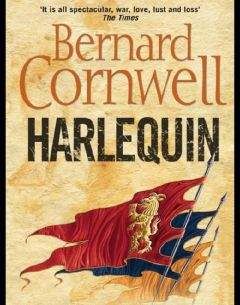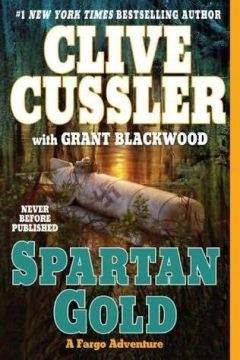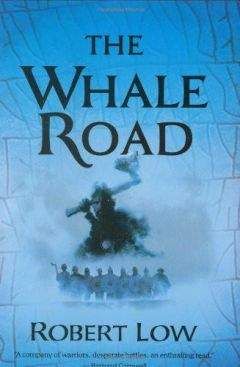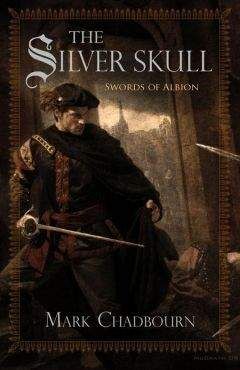Haragg came from the door with a startled expression. He was completely bald now and unnaturally thin, so that he looked old before his time. The arrow's strike had left him sick for a long time and there had been days when Saban was sure the breath would die in the big man's throat, but Haragg had survived. Yet it seemed to Saban that he was wounded in his spirit far more grievously than in his body. Haragg now stared at Camaban and, for a heartbeat, did not recognise the man with a striped face, then he smiled. 'You've come back!' he said.
'Of course I've come back!' Camaban snapped. 'I always said I would, didn't I? Don't just gaze at me, Haragg, come! You and I have much to discuss and far to travel.'
Haragg hesitated an instant, then abruptly nodded and, without even looking back at his hut, let alone fetching anything he might need, followed Camaban towards the trees.
'Where are you going?' Saban called after them.
'To Ratharryn, of course!' Camaban said.
'You're walking?' Saban asked.
'I never wish to see another boat,' Camaban said fervently, 'so long as I live,' and with that he walked on. To make his new temple even greater. To tie Slaol to the living and the dead to Slaol. To make a dream.
—«»—«»—«»—
'Camaban is right,' Aurenna said that evening.
'He is?'
'Erek saved us,' she said, 'so we must travel where he wishes. It is our duty.'
Saban rocked back and forth on his heels. It was night, the children were sleeping and the fire was burning low to fill the hut with smoke. The wind had dropped and the rain had ended, though the eaves of the thatch still dripped. 'Camaban said nothing of you going to Ratharryn,' Saban said.
'Erek wants me there,' Aurenna retorted.
Saban groaned inwardly for he knew he must now argue with the god. 'My brother Lengar would want nothing more than for me to take you to Ratharryn. He will see you, lust after you and then take you. I shall fight for you, of course, but his warriors will cut me down and you will be forced onto his pelts and raped.'
'Erek will not permit it,' Aurenna said placidly.
'Besides,' Saban said petulantly, 'I don't want to go to Ratharryn. I'm happy here!'
'But your work here is done,' Aurenna pointed out. 'There are no more boats to be made and no more stones to be fetched down the mountain. Erek's work moves to Ratharryn and he saved our lives, so that is where we shall go.' She smiled. 'We shall go to Ratharryn and we shall wind the world back to its beginning.'
It was an argument Saban could not win for Erek was against him, and so Aurenna readied herself and the children for the voyage. Yet the sea winds would not abate and still the great waves broke white and ragged on the headland and day after day passed until the summer brought bramble blossom and bryony, bindweed and speedwell, and still Lewydd would not risk the journey. 'The gods,' Lewydd said one night, 'they are holding us back.'
'It's the missing stones,' Aurenna said. 'The two that we lost in the river and the one that broke on the mountain. If we don't replace those stones the temple will never be complete.'
Saban said nothing, though he did glance at Lewydd to see how he would respond to the thought of fetching more stones from the mountains.
Aurenna closed her eyes and swayed back and forth. 'It is a temple to Erek,' she said softly, 'but it is being built to draw him back to Modron' — Modron was the Outfolk name for Garlanna — 'so we should send one stone for her. One great stone to replace the three that were lost.'
'We could fetch one more stone from the mountain,' Lewydd said grudgingly.
'Not from the mountain,' Aurenna said, 'but from here.' In the morning she showed Lewydd the greenish boulder beside the river where she and Saban liked to sit, the great stone with shining flecks and pink sparkles embedded in its heart. The mother stone, Aurenna called it, for it lay in mother earth's dark grip while the rest of the boulders had been plucked from the hanging valley in Erek's sky.
It was vast, that mother stone, twice the weight of the heaviest of the temple's pillars, and it lay deeply embedded in the grassy bank. Saban stared at the stone for two days, trying to work out how to shift it, then he and Mereth went into the woods and found six tall trees that they chopped down. They trimmed the trunks into smooth poles, then cut them into eighteen shorter lengths.
Next day they lifted the mother stone from the earth with levers of oak. Saban dug deep on either side of the stone, scraping holes like badgers' setts far under the rock, and the levers were thrust down into the earth and then, with six men on either side, the front end of the rock was heaved up. It came reluctantly, and men had to scrabble the earth away from beneath the boulder to free it from the soil's grip, but at last it lifted and Mereth could thrust one of the short rollers under the stone.
For three days they levered and lifted until the stone was resting on the eighteen rollers, and now Lewydd could bring one of the empty triple-hulled boats in to the bank. He tethered the craft with its bows facing the stone, then waited for the tide to drop so that the boat was stranded on the mud. Once the boat was in place, Saban's men levered the rock forward while others stood in the riverbank's mud and tugged on ropes to drag the mother stone along the rollers. The boulder was almost three times the height of a man, but slender, and it rolled willingly enough. Men dragged the rollers as they emerged behind the rock and placed them in front of it, and so, hand's breadth by hand's breadth, the great slab was dragged and pushed until one end of it jutted out from the bank to overhang the stranded boat.
'Careful now!' Saban called. One of the rollers had been placed on the boat and two men held it in place as a dozen others manned levers at the back of the stone. 'Heave again!' Saban called, and the great slab edged forward and then began to tip down. 'Let it tip! Let it tip!' Saban shouted, and watched as the stone's forward edge swung down to rest on the boat. The three hulls creaked alarmingly under the stone's weight. More rollers were placed on the boat and the men levered again and, as the rain speckled the river and the women watched and the tide rose, the vast tongue of stone was pushed onto the boat. The mother stone was so long that it almost filled the boat's whole length.
'Now to see if it floats,' Lewydd said, and he, Saban and Aurenna waited on the river bank as night fell and the tide went on rising. They lit a fire and by its light they saw the dark incoming water swirl about the boat's three hulls. Higher and higher the water came until Saban was sure that it must rise above the boat's gunwales and so flood the hulls, but then the mud under the boat yielded a sucking sound and the three hulls were shifting in the current. 'I never thought we'd move that stone,' Lewydd said wonderingly.
'We've still got to shift it to Ratharryn,' Saban said.
'Erek will help,' Aurenna claimed confidently.
'The boat floats low,' Lewydd said, worried, and explained that at sea the waves inevitably slopped over the hull's gunwales to flood the boats. The outer hulls, where the paddlers knelt, could be bailed easily enough, but the mother stone was so long there was scarce room for a man to crouch in the central hull.
'Put a small boy there,' Saban suggested, and in the morning they discovered there was just room for a boy to crouch in front of the stone, and another behind it, and Lewydd reckoned that if the two boys kept scooping out the seawater then the heavily laden boat might survive the voyage. 'So long,' he added, 'as the weather is kind.'
But the weather stayed hard. The boats waited, the warriors were ready to travel, but the winds heaped up the seas and brought yet more stinging rain. Another moon passed, the summer was slipping away and Saban began to fear he could never leave. Or hope he could never leave, for he did not really want to go back to Ratharryn. Home was Sarmennyn, beside this river, where he had thought he would live out his life, watch his children grow and become a member of Kereval's tribe. He would put Sarmennyn's scars on his face and rub ash into them so that they showed grey. Only now Camaban and Aurenna insisted he go back to the heartland and Saban did not want to go, so he welcomed the bad weather that kept him beside Sarmennyn's river where he and Mereth whiled away the wasting time by shaping and hollowing a trunk that had been rejected as too short to be turned into one of the hulls for carrying the stones, but which would make a fine fishing craft. They planned to give the boat to Lewydd as a reward for moving the temple.
Mereth had taken a wife from the women of Sarmennyn and he too was wondering whether to go or stay. 'I'd like to see my father again,' he said, 'and Rai wants to see Ratharryn.' Rai was his wife.
Saban tipped a bag of beach sand into the new boat, then rubbed it up and down with a stone, smoothing the wood. 'It will be good to see Galeth again,' Saban said, and he thought it would also be good to visit his father's grave, but he could think of no other reason to take him back to his childhood home. He touched the nutshell under his jerkin, then rocked back on his heels and wondered why he was so reluctant to return. Of course there was fear of Lengar, but Saban possessed the nutshell charm and he believed it would work, so why was he frightened of going home? If the temple was built then Slaol would return and all would be well, and he glanced out into the river where the stones floated on their boats. When those stones reached the Sky Temple the dream would be completed, and then what? Would everything change? Would Slaol scorch through the sky to obliterate winter and sickness? Or would the world change slowly? Would anything happen at all?
'You look worried,' Mereth said.
'No,' Saban said, though he was. He was worried by his unbelief. Camaban believed, Scathel believed and Aurenna believed, indeed most of Kereval's people were sure that they were changing the world, but Saban was not certain he shared their faith. Perhaps, he decided, it was because he alone had known Camaban as the crooked child, as the outcast stutterer, the despised son. Or perhaps it was because he had fallen in love with this river and its banks. 'I was thinking,' he said, 'maybe I could share this boat with Lewydd? Become a fisherman?'
'All you'll ever catch is a cold,' Mereth said. He shaved a trace of wood so that the rising curve of the prow looked perfect. 'No,' he said, 'I reckon you and I are going home, Saban, and we might as well get used to it. It's what our wives want and what wives want they seem to get.'
The summer passed and the winds did not abate and Saban doubted the stones would leave the river that year, but then, just as it had in the very first year, the approaching autumn brought a spell of calm seas and gentle winds. Lewydd waited two days, spoke to the fishermen, prayed at Malkin's shrine and then declared the small fleet could leave. Food and water were put back into the boats, the warriors took their places, and Mereth and Saban settled their families in two of the long, single-hulled craft that would escort the stones eastwards. Scathel sacrificed a heifer and splashed its blood on the tightly lashed stones, Kereval kissed his many wives and it was time to go.
The heavily laden boats went downstream to the lee of the headland in the river's mouth with the paddlers chanting a song to Erek. The folk left behind stood on the river bank and listened to the strong voices fade. They listened until there was no sound but the running of the river and the sigh of the wind. Sarmennyn had kept faith. It had sent its temple to Ratharryn and all the folk could do now was wait for the return of their chief, their high priest and their treasures.
The weather was placid, and it needed to be, for the boat holding the mother stone was clumsy and slow. When Saban had first made this voyage it had seemed swift, but then he had been in a single-hulled boat that had cut through the water like a knife slicing flesh, but the big, triple-hulled boats seemed to batter their way through the waves. The tide carried them and the paddlers worked themselves to weariness, but it was still an agonisingly slow voyage. Saban and his family shared one of the boats carrying Kereval's warriors and that was frustrating for the boat could have leapt ahead of the fleet, but instead had to stay with the lumbering stone-carriers. The mother stone was the slowest, and the two small boys in the centre hull had to bail water constantly. If the boat sinks, Scathel had warned the boys, they would be blamed and would be allowed to drown, and the warning kept them hard at work scooping with their sea-shells. Aurenna clutched Lallic, while Leir had a leash about his waist so that when he fell overboard he could be hauled back like a fish. The sun shone, proof that Erek approved their voyage.
They anchored at each tide's turning and set off when the water flowed east again. It did not matter whether that turning came by day or night; that they slept between the tides and, as often as not, travelled beneath the stars. The moon was a sickle, low in the sky, so there seemed little danger of Lahanna's jealousy thwarting the journey. Day after day, night after night, the stones crept eastwards until at last, after nine days and nights, the sun rose to show the green hills close on either bank, with the great shining mud flats slowly drying as the river shrank. They paddled hard, racing to keep with the dying tide and competing with each other as the banks came closer and at last Sul's mouth came into view. The paddlers drove the boats up into the narrower stream, between the high mud flats, past fish and eel traps, to where a small settlement of fishermen had their huts near the palisade Lewydd had made on the very first journey of the stones, and there at last they could rest. Scathel gave a stone axe-head to the chief of the settlement in return for a scrawny goat that he sacrificed to Erek as thanks that the most dangerous part of the journey was done. The fisherfolk watched bemused as the Outfolk warriors danced to the setting sun. In times past there would have been nothing but enmity between the two groups, but the settlement gave their allegiance to Drewenna and the river folk had become used to the voyaging stones.
Lewydd sent one of the fishermen with a message to Kellan, Drewenna's chief, asking of him to send men to haul the sledges which waited at the end of the first river journey, and next morning they started up the Sul with the incoming tide. That first day was easy enough, but after then the tide was of small help and they had to pole the boats upstream. It took three days to reach Sul where Kereval decreed they would rest for two days. Aurenna and Saban took the children to splash in the hot spring that bubbled over the rocks to make a pool amidst ferns and moss. The rocks above the pool were strewn with scraps of wool where petitioners had left their prayers for the goddess and all that day a succession of the lame, the crippled and the sick came to the shrine to beg Sul's help. Aurenna washed her hair in the spring and Saban combed it out for her and the folk of Sul watched in amazement for she was so tall, so clean and so calm. One man asked Saban whether she was a goddess, while another offered him seven oxen, two axe-heads, a bronze spear and three of his daughters if Aurenna would be his wife.





